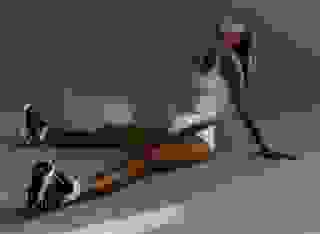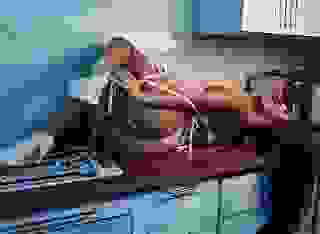- Romance
- There Is Love
Note: You can change font size, font face, and turn on dark mode by clicking the "A" icon tab in the Story Info Box.
You can temporarily switch back to a Classic Literotica® experience during our ongoing public Beta testing. Please consider leaving feedback on issues you experience or suggest improvements.
Click hereIn March of 1965 I celebrated my eighteenth birthday with a cake my mother baked and a night out with my girlfriend that Saturday. The next Monday, I registered for the draft. I wasn't too worried about being drafted into the US Army because I'd already been accepted at MTSU as a music education major. I ended up having to take the Selective Service Qualification Test but I had a deferment from the draft for the four years it took me to get my degree.
At that time, I was certain that given how the US had helped defeat the Axis in WWII and had held their own against the Chinese in Korea, any war in a tiny little country like Vietnam couldn't last for four years. I gave it another year, maybe two years tops. The US would stop drafting men then, and I'd get out of college and start teaching music in some high school somewhere.
Popular music in those days was a mix of pop, folk music, country, and the beginnings of rock and roll. There was also classical and big band music for the older folks. Classical music was what my high school band played at our concerts and we played Sousa marches at the football games. I played the trumpet and it was a lot of fun marching in the homecoming parade and at half time of every home football game. It was fun playing in the concert band too, but the little stage band was more fun. We played big-band tunes for at least one dance every fall, and it was fun and a little funny watching the parents dance to swing tunes from the war years.
My real love, though, was the guitar. I'd played guitar since I got one as a Christmas present when I was twelve. It wasn't much of a guitar, just a Silvertone from Sears & Roebuck, but it was a real guitar. The English teacher at my high school, Mister Jacobs, also played guitar and taught lessons, and my parents signed me up for lessons with him two days a week after school.
After two years of lessons, I was getting the hang of things enough my old Silvertone wasn't up to the task. The neck had bowed some, so playing high notes meant I had to push the strings down further to get them fretted and that messed up the intonation. Mister Jacobs showed me what wrong and when I asked him if it could be fixed, he shook his head.
"Maybe, but you'd be looking at almost the price of a new guitar. You'd be better off finding a good used guitar like a Gibson or a Martin. It won't matter much how old it is or what it looks like as long as the neck is straight. It'll still be a better guitar than your Silvertone."
I kept playing the Silvertone, but as soon as I turned sixteen, I got a summer job in a grocery store in my hometown, Gallatin, Tennessee. I worked four hours a day, three days a week that summer, and when school started, I could work four hours on Saturday. After income taxes and buying some clothes I wanted, by that spring I had seventy-five dollars in my guitar fund. That summer, I worked in the same grocery store, but the owner let me work eight hours a day. When school started that fall, I had another hundred dollars in my checking account. I went looking for a new guitar.
Most guitars used by the professional musicians of the day were electric, so they needed an amplifier. I didn't really care for the sound of an electric and I didn't have enough money to buy an amplifier to go with an electric, so I was looking for a good acoustic guitar. An acoustic fit right into my favorite kind of music as well. I really liked folk music.
There were several stores that sold guitars in Nashville and I went to them all. Most had Gibsons and Martins, and playing them made me realize just how much better they were. The problem was they were way out of my price range. After I'd played two Gibsons and then told the salesman I loved how they played but I couldn't afford them, he gave me some advice.
"You're just looking in the wrong place. Try some of the pawnshops. A lot of guitar players come to Nashville hoping to make it big in country music. After a year or so of not getting anywhere, they're down to their last dime so they hock their guitars to get enough money to go back home. You might find a pretty nice guitar that you can afford."
At the third pawn shop I visited, I did. She was a Gibson J200 and I thought the sunburst finish was gorgeous. She did have some case wear in a couple of places and the finish on the back of her neck was all but gone, but her neck was straight as a string. When I tuned her up and played her, she played like a new guitar.
I had to haggle with the pawn shop guy a little. He wanted a hundred and seventy dollars for her and a beat up hard case. I had that much, but I wanted new strings. I said I'd give him a hundred and sixty if he'd throw in two sets of strings. We settled on a hundred and sixty five with one set of new strings and a better case. I named her Lucille.
By the time I was a senior, I'd been listening to music by some of the best jazz guitar players, and liked the style where they played music by "finger picking" instead of just strumming chords. I practiced imitating that style for hours until I could usually pick out a song after I'd heard it a couple of times. I'd also changed from trumpet to guitar in the stage band, so I got a lot of experience in playing chords and the occasional guitar solo.
When I went to MTSU that fall, I took Lucille with me. Playing wasn't just enjoyable for me. It was also relaxing. If the weather cooperated, on Saturday and Sunday I'd take Lucille out on the lawn in front of the dorm and play the folk songs that were popular at the time. If it was raining, and later when the weather turned cold, I'd take Lucille down to the common area of the dorm.
One cold Saturday afternoon in February, I was down in the common area with Lucille, sitting by myself and quietly playing a song I really liked. It was "Blowin' In The Wind", by Peter, Paul, and Mary. A guy and his girlfriend walked past me on their way to the TV set at the other end of the room. Women weren't allowed in the men's dorm except for in the common area, and since most guys didn't have a lot of money, the common area was a place where you could take a girl on sort of a date without spending money.
Well, anyway, as they walked past me, the girl stopped and then walked over beside me. She waited until I started the next phrase of the song and then started singing the words.
I knew she was there but I hadn't been paying attention her. People sometimes stopped to listen when I was playing and then walk on. When she started singing, I looked up at her.
In 1966, women were expressing their rejection of social norms with mini-skirts and tops that accented their breasts, hips, and legs instead of trying to hide their figures. This girl wasn't though. She had on a drab, brown flowing dress that reached from her neck to her ankles, and her shoes were leather moccasins. That was unusual, but the thing that drew my eye was her hair. She had dark brown hair that spilled over her shoulders and down over her chest almost to her waist.
She wasn't especially pretty, just sort of average, but her voice was fabulous. She was a low alto, and the tones were clear as a bell. She was smiling too.
When she finished the last verse of the song, I played a short ending and then looked up at her and grinned.
"With a voice like that, you should be making records."
She grinned back.
"That's what I want to do some day, but Daddy thought it would be best if I learned how to do something else in case that doesn't work out. I'm studying accounting. You're pretty good yourself."
About then, the guy she was with cleared his throat. He sounded more than a little aggravated.
"Carly, I'll be watching TV when you get done here."
She looked over at him, said, "OK, be there in a minute", and then turned back to me.
"Hi. I'm Carly. I love Peter, Paul, and Mary. I know almost everything they've ever recorded. What else do you know by them?"
I smiled. "I'm Mark, and they're one of my favorite groups too. How about this one?"
I started "Puff, The Magic Dragon". Carly let me finish an intro, then started singing the words. I didn't consider myself to be a good singer, but when it came to the chorus, I tried singing in harmony with her.
There is a weakness musicians have and that weakness is we love music so much that once you get us started, it's very hard to get us to stop. Before I knew it, we'd finished four more songs and I was picking out an intro to "There Is Love".
Neither of us had done much except look at each other and sing, but when we finished "There Is Love", we heard people clapping. I looked up and there were maybe a dozen people standing there. I noticed the guy Carly had been with wasn't one of them. He was watching the TV and looking back at us about every ten seconds.
Carly looked at me and grinned.
"I think they like us. Let's do some more. Do you know "This Land Is Your Land"?
I nodded, and started the song. Carly stopped me then.
"Can you drop it down a couple notes. I don't think I can hit the high notes in this key."
I changed the key from G to E and played a chord. Carly smiled.
"I can do that."
About then, a guy with a beat-up looking Martin D-12 walked up to Carly.
"Can I sit in? I can play chords and I can sing a little too."
Carly looked at me, and I nodded and played a high G. The guy spent about a minute tuning his guitar to the same pitch and then played a chord. It sounded good to me, so I started the intro.
Sometimes magical things happen with music, and one did that afternoon. The guy listened to my intro, then nodded when Carly started to sing and started playing the right chords. After the second verse, Carly grinned and looked out at the people standing around. It looked to me like everybody who'd been in the common area except Carly's boyfriend were standing there. He was nowhere to be found.
Carly raised her voice a little.
"Everybody, join in. You know the words."
Well, everybody did, and I got this tingly feeling I only get when a piece of music really hit's home with me. It was like something had switched on in me, and I saw the same thing was happening to Carly. She was starting to sway with the music and she was really urging on our audience. I looked over at the guy who'd joined us, and he was grinning too.
When we finished, there was another round of applause, and then a girl waved her hand.
"Do you know, "Where Have All The Flowers Gone?"
Carly looked at me and I nodded. The other guy said, "No, I don't, but play a few bars so I can hear the chord changes and I'll do OK".
I picked out the melody of one verse, then finger-played the first chord over and over and looked at the guy. He nodded and started playing the chord too. I nodded to Carly.
Well, it was more magic with that song. Carly sang the first verse, and after she sang the second -- "Where have all the young girls gone" -- she quickly added "long time passing" and waved at the people listening. When she sang, "long time passing", two of the girls in front sang along with her.
Carly did the same thing with "long time ago", and this time almost all those standing there joined in. By the time we finished the song, everybody was singing those two phrases with Carly as well as the last two lines, "When will they ever learn, When will they ever learn".
By then, it was time to go to the dining room for dinner, so the crowd thinned out pretty fast. When it was just the three of us, we finally got around to introductions.
The other guy was David Moss, and he was studying to be a chemist. He'd been playing country music since he was ten and he really knew his way around a guitar. Carly told him he had a nice singing voice too and I agreed. I was a baritone and David was a tenor, and he understood harmony. I'd heard that during that last song and thought our voices blended very well.
We talked about what had happened for a while before Carly said she thought we should form a group and maybe we could make a little money on the weekends. I hadn't thought about that. I was happy just playing for myself, but the more she talked, the more I liked the idea. I'd liked the way we sounded and evidently the group who'd been watching and listening to us did too.
That afternoon, the folk group, "David, Mark and Carly" was born. Yeah, we borrowed the way of naming our group, but we didn't figure Peter, Paul, and Mary would care since we probably weren't going to be serious competition for them.
That first year was pretty tough, and if we hadn't loved playing and singing together so much, we'd probably have given up. As it was, we did get a few gigs in a couple of campus bars and that told us we might have a future together.
I was wondering if Carly and I might have a future together too. I was careful not to get as close to her as I'd have liked. There was no way I could have dated her because I had it in my head that a man was supposed to take a girl out for dinner once in a while. I was pretty much flat broke except for a little money Mom and Dad sent me every month.
Over the next three years we got more recognition for one main reason. The war in Vietnam wasn't winding down. Instead, it was on television every night, and it seemed like the US was putting more men over there without really trying to win it. As a result, the anti-war movement gradually seeped into MTSU until it became a large group of people. The music we played and sang fit in well with the whole war protest movement.
When the spring of 1969 rolled around, David, Carly, and I sat down to talk about what was going to happen once we graduated. Carly wanted to keep singing together and find an agent in Nashville. David and I weren't too sure. In another few months, it was likely we'd both be drafted. We did agree to try though, and we cut a demo tape one afternoon.
That demo tape turned out to be a waste of time. We graduated in June, and David and I got our draft notices a month later. We had a week to get our things in order before the draft physical. After we both passed that physical and got to make a phone call or two, the Army put us on a bus to Fort Knox, Kentucky. Mom and Dad didn't say much when I called them. Dad had gone through the same thing during WWII so they figured it was only a matter of time. Carly knew it too, but that didn't stop her from crying when I told her.
There's not much I care to remember about the next year and a half. I'll just say that David and I both ended up in Vietnam, and that I made it through that hell and came home. David came home too...in an aluminum coffin. We'd been assigned to the same unit, and one night our firebase was almost overrun. David's foxhole took a direct hit from a VC mortar.
Carly had written letters to me to start out, but like a lot of friendships and romances do during a war, that sort of petered out over time. I couldn't blame Carly because it was my fault. I stopped returning her letters for two reasons.
Once I'd been my first firefight, I realized my chances of getting home in one piece weren't very good. I'd seen a lot of guys get severely injured or killed and they hadn't done anything wrong except be in the wrong place. The other reason was I'd never said anything to Carly about liking her. She had her life to live and I couldn't expect her to put her life on hold waiting for me to come back when I hadn't even said I liked her.
When I got back to the states, I still had six months of my two years to serve. It was kind of a screwed up six months. I had no intention of re-enlisting so the Army didn't really have a place for me. I ended up at Fort Dix, New Jersey as part of the cadre of the new recruit center. I didn't have much to do there, so I started sending out resumes to the school systems around Nashville. After a few rejections, I finally got hired as the music teacher for Briarwood High School in Williamson County.
Over the next thirty-one years, I taught band and chorus at Briarwood and along the way managed to fall in love with the English teacher and marry her. We had two kids, Jack and Margaret, and saw them through college. Both because I still loved music and also to bring in a little extra income, I started sitting in as a session guitar player for a recording studio in Nashville. Lucille was getting pretty worn looking by then, so after I got paid a few times, I bought another Gibson, this time a new J-200 Custom. Lucille went into her case in the hall closet and I named the new Gibson Vicky.
Just like when I was in college, playing guitar was a way to relax after working all week teaching kids how much fun music can be. It was a refreshing change to take Vicky to a recording studio and sit in with musicians who knew what they were doing. Mostly I backed up aspiring country singers who couldn't afford their own band. Most gave up, but a couple did eventually make it. I was proud that in a small way, I'd helped them.
Those session gigs became even more important to me after June, my wife, was diagnosed with cancer. We fought it together for a year before she passed on. We'd been married for twenty-nine years and losing her was like losing my right arm. I was fifty-five and by myself again, and the only things that kept me going were teaching and my session gigs.
Of the two, the session gigs were doing more for me. Teaching was still fun, but it was getting harder and harder to explain to kids why we were playing classical music in the concert band and still playing the music of WWII in the stage band. They wanted to play rock and roll. It's really hard to translate fuzzed guitar and bass runs into clarinet and trumpet, so there wasn't much rock music available for concert bands.
At the end of the school year in 2003, the year after June passed away, the junior high music teacher resigned. The Superintendent of the school system called me to his office the last day of the semester and told me the district had decided not to hire another music teacher for the junior high. Instead, I'd split my time between the junior high building and the high school. They were going to drop the chorus program so I'd have time.
Losing the chorus didn't bother me too much. My chorus the last couple of years had drawn only a dozen or so kids. It was probably time it did end. Chorus wasn't my favorite type of music anyway. I could teach a kid how to play the right notes on a french horn or a trombone, but a kid who couldn't hear the right notes when he or she sang them was pretty hard to fix.
The next year, I started teaching band in the junior high school. The way it worked was for an hour, five mornings a week, I'd lead the high school band in practice sessions. Four afternoons a week I'd teach each individual junior high kid for half an hour how to play their instruments and on Friday afternoon, they'd all come together for an hour to practice as a band.
That was working pretty well, and by Thanksgiving, my junior high band knew enough to have a Christmas concert. I knew the parents would love to see their kids playing for them, and it was also a way to keep parents interested in the school system keeping the music program and my job going. A lot of school systems had started to drop the music program altogether.
I'd scheduled the junior high Christmas concert for the second Friday night in December. From Thanksgiving on, I practiced with them until we had ten songs down pat except for the occasional squeak from the woodwinds and a gurgle from a trumpet that needed the spit blown out.
The night of the concert, I had them all sitting in chairs with the music stands in front of them and their instruments on their knees. I crossed my fingers, stepped onto the podium, then raised my baton. Just like we'd practiced, every horn and woodwind came up and the drum section all crossed their sticks in front of their chests.








